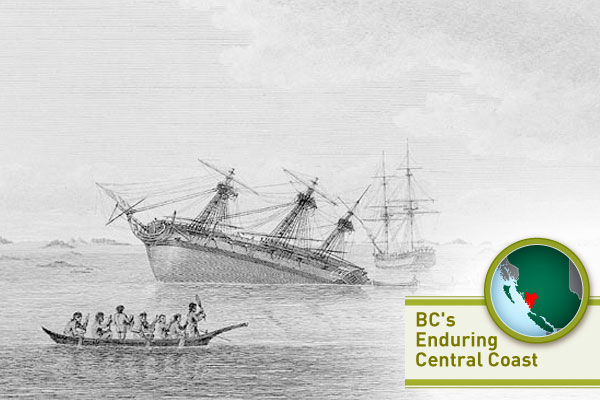Ghosts Towns and Living Defenders: A Coastal Timeline
Scroll through hundreds of years of human drama along BC's Central Coast. Part of this week's series.
![]()

Captain George Vancouver's ship Discovery ran aground in Queen Charlotte Strait in August 1792. Artist unknown, from Vancouver: A Voyage of Discovery to the North Pacific Ocean, and Round the World, 1801 edition.
![]()
Captain George Vancouver's ship Discovery ran aground in Queen Charlotte Strait in August 1792. Artist unknown, from Vancouver: A Voyage of Discovery to the North Pacific Ocean, and Round the World, 1801 edition.
[Editor's note: Earlier this year, a special team of Tyee Solutions Society reporters had the chance to spend some time on B.C's Central Coast. This is their latest report. Scroll down to see the visual timeline. See all of their reports here.]
To a first-time visitor, B.C.'s Central Coast may seem "wild" and "pristine." Really, it is neither. The coast is the longest-inhabited part of the continent -- with a deep and often tumultuous past.
Some 12,000 years in the past, a mere geological moment ago, most of the coast was buried beneath hundreds of metres of ice that filled what today are river valleys rich in forests and wildlife, scraping them bare to their rock. The landscape they left behind would have been post-apocalyptic in appearance.
As Jude Isabella reported earlier in this special series of reports, archaeological evidence is confirming that soon after those ice sheets receded, people arrived, settling the coast even before cedar forests rose from the bracken and shrubs that found the first foothold or the retreating glaciers re-opened rivers to salmon. Over time, those people harvested, managed and modified their surroundings "from mountain top to sea-floor," developing a resilient resource-based economy that endured for ten millennia.
That balance began to change in the late 18th century. Invisible and undetected, pathogens likely borne on trade goods or carried by asymptomatic traders themselves unleashed the first of what would prove to be several waves of deadly plague -- including but probably not limited to smallpox -- which devastated river and coastal communities.
In 1775, the first Europeans to visit the coast of what would become British Columbia were Spanish explorers led by Juan Francisco de la Bodega y Quadra who reached the site of present-day Sitka, Alaska. But it was the English, who arrived a few year's later under Captain George Vancouver, who would stay to make the coast and eventually the interior a colony of the British Crown.
In 1843, Hudson Bay Company fur-trader James Douglas established a trading post at the southern tip of the coast's biggest island, naming it Fort Victoria after the newly crowned Queen. Twenty-eight years later, it became the capital of the new Canadian province of British Columbia.
To follow more of the dramatic history of B.C.'s enduring Central Coast, scroll through time, starting here:
Yesterday's "BC's Enduring Central Coast" series included a story about exciting finds from archaeological digs showing ancient human settlement going back 10,000 years, and a video explaining the ancient technique of capturing salmon in stone fish traps.
Tomorrow: First Nations guard their history and defend their claim to the coast.
The entire multi-part series is collected here as each part is published this week.



What have we missed? What do you think? We want to know. Comment below. Keep in mind:
Do:
Do not: